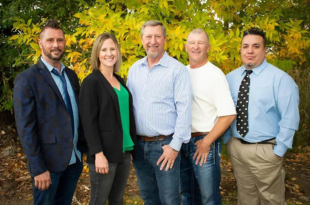Colorado Assisted Living Facility Insurance

8:30am - 5:00pm Mon-Fri
We'll Reply in 15min*
Index
Contact Us
Phone
303-421-5123
Location
9035 Wadsworth Parkway
Suite 2730B
Westminster, CO 80021
As the population ages, the demand for assisted living facilities continues to grow in Colorado. These facilities provide essential services to seniors who require assistance with daily activities while allowing them to maintain a degree of independence. However, operating an assisted living facility comes with its own set of challenges, including the need for adequate insurance coverage. In this article, we will explore everything you need to know about insurance for assisted living facilities in Colorado, including types of coverage, legal requirements, and tips for choosing the right policy.
Understanding Assisted Living Facilities
Before diving into insurance specifics, it's important to understand what constitutes an assisted living facility. These facilities are designed to support seniors in their daily lives, providing services such as meals, housekeeping, medication management, and personal care. Unlike nursing homes, assisted living facilities typically offer a more home-like environment, allowing residents to enjoy greater independence. This environment often includes private or semi-private apartments, communal dining areas, and common spaces for socialization, which foster a sense of community among residents.
The Role of Assisted Living Facilities
Assisted living facilities play a crucial role in the continuum of care for seniors. They bridge the gap between independent living and skilled nursing care. Many residents choose these facilities when they find that living alone becomes challenging due to health issues or mobility limitations. The staff at these facilities is trained to provide the necessary support, ensuring that residents can live comfortably and safely. Moreover, these facilities often focus on promoting wellness and enhancing the quality of life through various programs that encourage physical activity, mental stimulation, and social engagement, which are vital for maintaining overall health.
Types of Services Offered
Services provided by assisted living facilities can vary widely. Common offerings include:
- 24-hour supervision and support
- Assistance with activities of daily living (ADLs) such as bathing, dressing, and grooming
- Medication management
- Meal preparation and dietary assistance
- Social and recreational activities
These services are tailored to meet the individual needs of residents, making it essential for facilities to have the right insurance coverage to protect both their operations and their residents. In addition to the standard services, many facilities also provide specialized programs such as memory care for residents with Alzheimer's or other forms of dementia. These programs are designed to create a safe and supportive environment that caters specifically to the cognitive needs of these individuals, allowing them to thrive despite their challenges. Furthermore, assisted living facilities often collaborate with healthcare providers to ensure that residents receive comprehensive care, including regular health assessments and access to therapy services as needed.

Why Insurance is Essential for Assisted Living Facilities
Insurance is a critical component of managing an assisted living facility. It protects the business from various risks, including liability claims, property damage, and employee-related issues. Without adequate insurance, a facility could face significant financial challenges that could jeopardize its ability to operate. Moreover, the peace of mind that comes with having proper insurance allows facility managers to focus on providing high-quality care for their residents rather than worrying about potential financial pitfalls.
Common Risks Faced by Assisted Living Facilities
Assisted living facilities encounter several risks, including:
- Injuries to residents or staff due to accidents or negligence
- Property damage from natural disasters or vandalism
- Legal claims arising from resident care issues
- Employee-related claims, such as discrimination or wrongful termination
These risks highlight the importance of comprehensive insurance coverage to mitigate potential financial losses. Additionally, the emotional toll of accidents or legal disputes can be significant, not just for the facility’s staff but also for the residents and their families. Ensuring that the facility is well-insured can help foster a safer environment, which is paramount in maintaining trust and satisfaction among residents and their loved ones.
Legal Requirements for Insurance
In Colorado, assisted living facilities are required to carry certain types of insurance. While the specific requirements may vary based on the facility's size and services offered, most facilities need to have:
- General liability insurance
- Professional liability insurance
- Workers' compensation insurance
Understanding these legal requirements is crucial for facility operators to ensure compliance and protect their business. Furthermore, staying informed about changes in legislation can help facility operators adapt their insurance policies accordingly. Regular consultations with insurance professionals can provide insights into additional coverage options, such as cyber liability insurance, which is becoming increasingly relevant as assisted living facilities adopt more technology in their operations. This proactive approach not only safeguards the facility's assets but also enhances the overall quality of care provided to residents, ensuring that their needs are met in a secure and supportive environment.
Types of Insurance Coverage for Assisted Living Facilities
There are several types of insurance coverage that assisted living facilities should consider. Each type addresses different aspects of risk management and is essential for comprehensive protection.
General Liability Insurance
General liability insurance is a fundamental coverage for any business, including assisted living facilities. It protects against claims of bodily injury, property damage, and personal injury that may occur on the premises. For example, if a visitor slips and falls in a common area, general liability insurance can cover medical expenses and legal fees associated with the claim. Additionally, this type of insurance can also safeguard against claims related to advertising injuries, such as defamation or copyright infringement, which can be particularly relevant for facilities that engage in marketing and promotional activities.
Professional Liability Insurance
Professional liability insurance, also known as errors and omissions insurance, is crucial for facilities that provide medical or personal care services. This coverage protects against claims of negligence or malpractice arising from the care provided to residents. For instance, if a resident suffers harm due to a medication error, professional liability insurance can help cover legal costs and settlements. Furthermore, this insurance can also extend to cover instances where a resident's care plan is not followed correctly, leading to adverse health outcomes. This aspect underscores the importance of maintaining meticulous records and adhering to established care protocols to mitigate risks.
Workers' Compensation Insurance
Workers' compensation insurance is mandatory in Colorado for businesses with employees. This coverage provides benefits to employees who are injured on the job, covering medical expenses and lost wages. For assisted living facilities, this is particularly important due to the physical demands of caregiving roles, which can lead to workplace injuries. In addition to covering immediate medical costs, workers' compensation can also provide vocational rehabilitation services for employees who may need to transition to different roles due to their injuries. This not only helps in retaining experienced staff but also contributes to a supportive work environment, which is essential in the caregiving industry where employee morale directly impacts resident care and satisfaction.
In addition to the essential coverages mentioned above, assisted living facilities may want to explore additional insurance options to further protect their operations.
Property Insurance
Property insurance covers damage to the facility itself, including the building and its contents. This coverage is vital in the event of a fire, theft, or natural disaster. It ensures that the facility can recover and continue to operate after a significant loss. Furthermore, it can also cover specialized equipment, such as medical devices and mobility aids, which are integral to the care provided to residents. By having comprehensive property insurance, facilities can mitigate the financial impact of unexpected incidents and maintain a safe environment for their residents.
Business Interruption Insurance
Business interruption insurance provides coverage for lost income due to unexpected events that disrupt operations, such as natural disasters or significant property damage. This type of insurance can help a facility cover ongoing expenses while it recovers from a crisis, ensuring financial stability during challenging times. Additionally, it can also encompass extra expenses incurred during the recovery period, such as temporary relocation costs or increased operational expenses. By having this safety net in place, assisted living facilities can focus on rebuilding and supporting their residents without the added stress of financial uncertainty.
Cyber Liability Insurance
With the increasing reliance on technology, cyber liability insurance has become essential for assisted living facilities. This coverage protects against data breaches and cyberattacks, which can compromise sensitive resident information. As facilities adopt electronic health records and other digital systems, safeguarding against cyber threats is crucial. Moreover, this insurance often includes coverage for legal fees and notification costs associated with a data breach, which can be substantial. As the healthcare sector continues to evolve digitally, having robust cyber liability insurance not only protects the facility's assets but also helps maintain the trust of residents and their families, who expect their personal information to be handled with the utmost care and security.

Choosing the Right Insurance Provider
Finding the right insurance provider is a critical step in ensuring that your assisted living facility is adequately protected. Here are some tips to help you make an informed decision.
Researching Insurance Providers
Start by researching insurance providers that specialize in coverage for assisted living facilities. Look for companies with a solid reputation and experience in the industry. Reading customer reviews and testimonials can provide valuable insights into the quality of service and claims handling. Additionally, consider reaching out to industry associations or local networks for recommendations. These organizations often have insights into which providers are most respected and reliable within the assisted living community.
Assessing Coverage Options
When evaluating potential insurance providers, carefully assess the coverage options they offer. Ensure that their policies align with the specific needs of your facility. Don't hesitate to ask questions about policy limits, exclusions, and any additional endorsements that may be beneficial. It’s also wise to inquire about specialized coverage for unique risks associated with assisted living, such as liability for resident injuries or property damage. Understanding the nuances of each policy can help you avoid gaps in coverage that could leave your facility vulnerable.
Comparing Quotes
Obtaining quotes from multiple insurance providers is essential for making an informed decision. Compare not only the premiums but also the coverage limits and deductibles. A lower premium may not always equate to better coverage, so it's crucial to evaluate the overall value of each policy. Consider using a spreadsheet to track the details of each quote, including any additional services or support offered by the provider, such as risk management resources or training for your staff. This comprehensive approach will help you identify the best option that balances cost with the necessary protection for your facility.
Cost of Insurance for Assisted Living Facilities
The cost of insurance for assisted living facilities can vary significantly based on several factors, including the size of the facility, the services offered, and the location. Understanding these factors can help facility operators budget for insurance expenses effectively.
Factors Influencing Insurance Costs
Several factors can influence the cost of insurance for assisted living facilities, including:
- The number of residents and staff
- The facility's location and local regulations
- The types of services provided
- The facility's claims history
Facilities with a history of claims may face higher premiums, while those with a strong safety record may qualify for discounts. Additionally, the level of care provided can play a significant role; facilities offering specialized services, such as memory care or skilled nursing, may incur higher insurance costs due to the increased risk associated with these services. Furthermore, the physical characteristics of the building, such as its age, construction materials, and safety features, can also impact insurance rates. For example, a facility equipped with modern fire suppression systems and security features may benefit from lower premiums compared to older buildings lacking these enhancements.
Average Insurance Premiums
While it's challenging to provide an exact figure for insurance premiums, assisted living facilities can expect to pay anywhere from a few thousand to tens of thousands of dollars annually, depending on the factors mentioned above. It's essential to work with an insurance agent to get accurate quotes tailored to your facility's specific needs. Moreover, operators should consider the potential for fluctuations in premiums due to changes in the insurance market or shifts in regulatory requirements. Facilities may also want to explore various coverage options, such as general liability, property insurance, and professional liability insurance, to ensure comprehensive protection. Investing time in understanding the nuances of insurance policies can lead to better financial planning and risk management for assisted living facilities.
Conclusion
In conclusion, insurance is a vital component of operating an assisted living facility in Colorado. With the right coverage, facility operators can protect their business, residents, and staff from various risks. Understanding the types of insurance available, legal requirements, and how to choose the right provider is crucial for ensuring comprehensive protection.
As the demand for assisted living facilities continues to grow, staying informed about insurance options and best practices will help operators navigate the complexities of this industry. By investing in the right insurance coverage, assisted living facilities can focus on providing high-quality care to their residents while minimizing financial risks.





